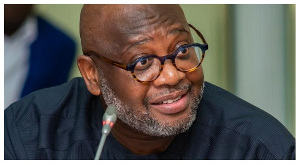Ninety-nine students who completed four-year Bachelor of Arts programme in Communication Studies at Ghana Institute of Journalism (GIJ), graduated on Friday.
This is the maiden graduation for degree students of GIJ since the programme began 11 years ago.
Mr Lee Ocran, Minister of Education, in a speech read on his behalf by Mr Paul Dzandu, Deputy Executive Secretary at the National Council for Tertiary Education, said the Ministry appreciated the pivotal role the Institute played in building a solid manpower base for the nation and Africa as a whole.
"The strides being made in our democracy would not have been complete without students of the institute," he said and added that the Ministry was committed to the development of the full potential of GIJ.
Mr Ocran said while the Government was highly appreciative of the role of journalists in educating the Ghanaian public, freedom of expression had to be guided by responsibility.
"As journalists, we must be mindful of the rights and freedoms of other persons in the discharge of our duties. You must at all times recognise the diversity of the country and promote national unity."
He urged the graduants to be guided by the principles of factual reporting and ensure balanced reportage, saying "Contact the relevant public officials for information before publication on what you might consider to be factual."
Mr David Newton, Rector of the Institute, said next year marked the end of GIJ’s affiliation with the University of Ghana (UG).
"It is our desire to organise a joint congregation for both the degree and diploma students on our own premises, to assert our independence as an autonomous Institute.”
Mr Newton said after 2013, the relationship between GIJ and UG would change from affiliation to partnership and collaboration of independent institutions and added that "After 11 years of successful implementation of degree programmes, GIJ is poised to mount post graduate programmes".
The Institute has, therefore, submitted a proposal to the National Council for Tertiary Education, for the introduction of six Masters’ Programmes in Development Communication, Media Management, Political Communication, Journalism, Public Relations and Advertising.
Mr Newton said as the Institute assumed the status of a fully fledged university, “We are mindful of the need to strengthen our quality control systems”.
The GIJ Rector announced that beginning next year, a quality control unit would be established to implement quality control policies, measures and procedures, to support the Institute’s academic goals and objectives.
He said the dream of developing the Institute’s new site into a modern university was still on course and said “With the allocation of 4.9 million cedis by GETFUND, we hope to complete the four-storey classroom, which is under construction by the end of 2013.”
Mr Newton entreated the graduants to be professional in their various fields of endeavour.
“You must be diligent, critical and tactful at all times, to avoid breaching either the laws of the country or the ethics of your own profession,” he said.
Professor John Gyapong, Pro-Vice Chancellor of University of Ghana, said having mentored GIJ through the degree programme: "We trust that the Institute has come a long way and is well grounded to stand on its own feet".
He said UG would be happy to provide guidance and encouragement at all times, to ensure national cohesion and expand the frontiers of academic and professional competence.
The Institute was established by Osagyefo Dr Kwame Nkrumah, Ghana's First President and officially opened in 1959.
Parliament enacted the Ghana Institute of Journalism Act (Act 717) 2006, to transform the Institute into a degree awarding tertiary institution with a Gazette notification of September 1, 2006.
Subsequently, the President granted a Charter to enable the institute award its own certificates, diplomas and degrees, for programmes accredited by the National Accreditation Board.
The certificate was signed by the President of Ghana in August, 2006.**
Regional News of Friday, 30 March 2012
Source: GNA
















